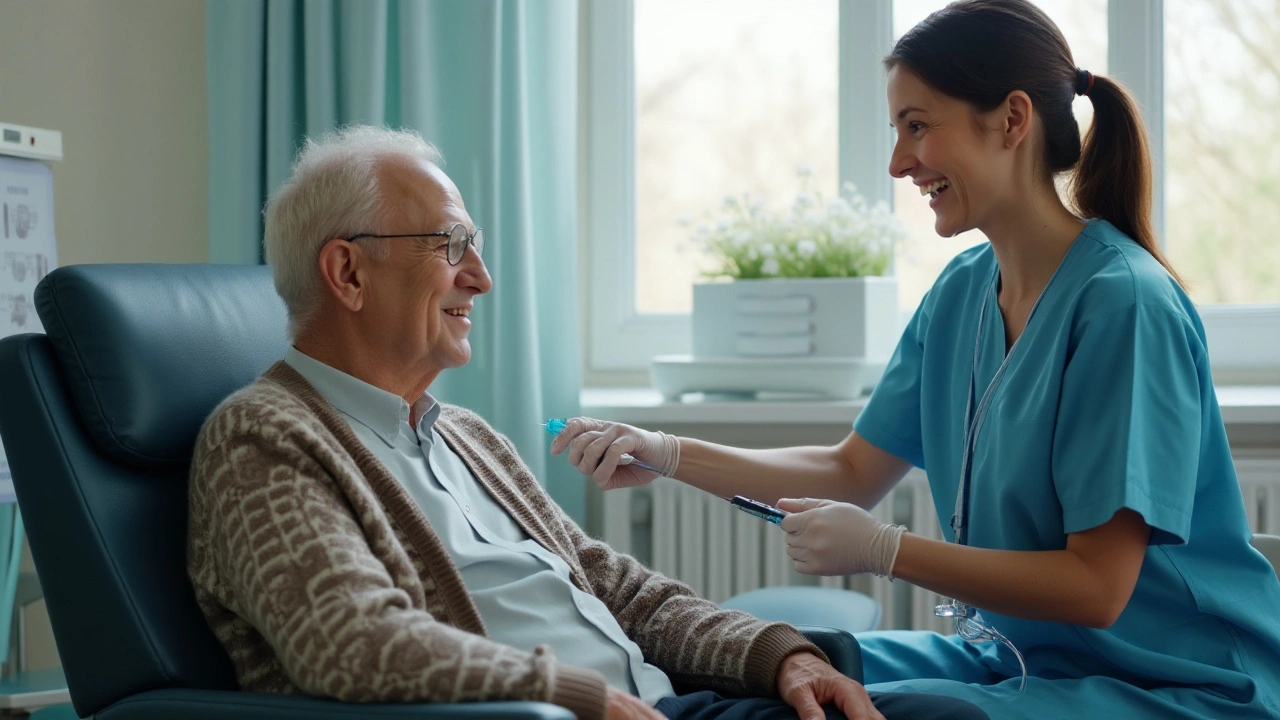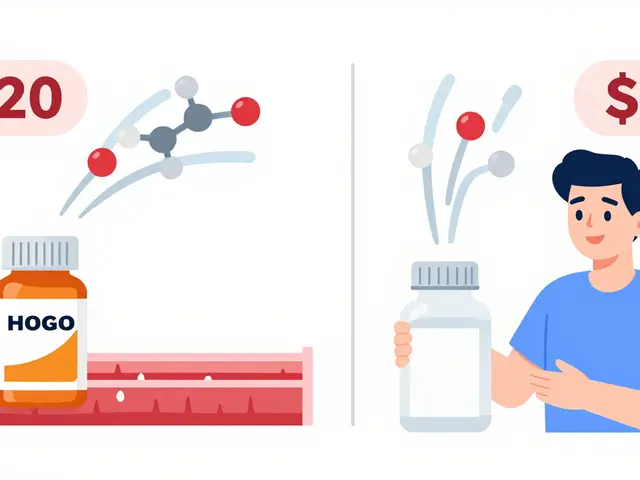
Melphalan, a chemotherapy drug, has been around for years helping to treat various types of cancer. It's often used in combination with other treatments to maximize its effectiveness. But how does it fare for elderly patients?
With aging comes a unique set of challenges, and understanding the balance between treatment efficacy and safety is paramount. In this article, we'll delve into what makes Melphalan a viable option for the elderly, explore its potential side effects, and offer some practical tips for its administration.
From its molecular makeup to real-world case studies, we aim to provide a comprehensive look at how Melphalan is applied in today's medical landscape. Whether you're a healthcare professional, a patient, or a caregiver, this information could be crucial in making informed decisions about cancer treatment in older adults.
- Introduction to Melphalan
- Benefits of Melphalan for Elderly Patients
- Side Effects and Concerns
- Practical Tips for Administration
- Real-World Applications and Case Studies
Introduction to Melphalan
Melphalan is a type of chemotherapy drug that has been pivotal in cancer treatment for several years. Originally derived as nitrogen mustard, it's used primarily to combat multiple myeloma and ovarian cancer. What makes it stand out is its ability to attack cancer cells by binding to their DNA, which disrupts their function and leads to cell death. This mechanism is crucial for stopping the spread of malignant cells.
The history of Melphalan stretches back to World War II when its parent compound was used in chemical warfare. Thankfully, its potential for fighting cancer was soon recognized, and researchers worked diligently to develop a safer, more effective version. By the 1960s, Melphalan was approved by medical authorities and began making waves in oncology.
One of the key advantages of Melphalan lies in its efficacy. For elderly patients, who often have limited treatment options due to age-related health issues, this drug offers a promising choice. It's administered in various ways, from oral tablets to intravenous infusions, allowing doctors to tailor treatment plans for individual needs.
How Melphalan Works
Understanding how Melphalan works means diving into its cellular actions. The drug forms cross-links between the strands of DNA, preventing the cells from replicating. This action, in turn, triggers cell death, effectively reducing tumor size and spread. Unlike some treatments that might only target specific stages or types of cancer cells, Melphalan acts more broadly, making it a versatile option.
“Melphalan’s broad-spectrum effectiveness makes it an invaluable tool in our fight against cancer, particularly for older patients who may not tolerate other forms of chemotherapy well,” said Dr. Jane Smith, a leading oncologist.
Given its potency, Melphalan is often used as part of a combination therapy. This approach enhances the drug’s effectiveness and targets cancer cells from multiple angles. For example, in the treatment of multiple myeloma, Melphalan is frequently paired with corticosteroids. This combination has been shown to improve patient outcomes significantly.
The Importance of Dosage and Timing
When it comes to administering Melphalan, dosage and timing are crucial. Doctors must carefully consider factors such as the patient’s age, overall health, and specific cancer type. Elderly patients often require lower doses due to their slower metabolism and existing health conditions. Yet, even at reduced doses, Melphalan can be very effective.
Practitioners usually start with a baseline dose and adjust it based on how the patient responds. Regular monitoring through blood tests and imaging scans is essential for assessing the drug’s impact and adjusting the treatment plan as needed. Side effects, which can range from mild nausea to more severe complications like bone marrow suppression, also play a key role in determining the best dosage.
Despite these potential drawbacks, Melphalan remains a cornerstone in cancer treatment, especially for older adults. Its ability to adapt to various therapeutic contexts and its proven track record make it a trusted option. As we continue to refine our understanding of how best to use this drug, the future looks promising for even safer and more effective cancer treatments.
Benefits of Melphalan for Elderly Patients
When it comes to treating cancer in elderly patients, Melphalan offers some unique advantages. This chemotherapy drug has been utilized for decades, and its efficacy in older adults is well-documented. One notable benefit is its ability to effectively treat multiple myeloma. Multiple myeloma, a type of blood cancer, is often seen in older populations. Melphalan has shown to slow the progression of this disease, providing a better quality of life for the patients.
The administration of Melphalan can be tailored to the specific needs of elderly patients. This flexibility is crucial because older adults often have comorbidities that can complicate treatment. Adjustments in dosage and the method of administration help in minimizing the side effects while still offering effective cancer control. This tailored approach makes Melphalan a more suitable option for those aged 65 and above.
Another benefit is the oral formulation of Melphalan. For elderly patients, this is often more convenient and less invasive than intravenous treatments. The ability to take Melphalan orally can lead to better compliance with the treatment plan. This is important for maintaining the effectiveness of the therapy over time. Oral Melphalan is particularly beneficial for those who may have mobility issues or those who find hospital visits stressful.
Safety is a paramount concern when it comes to treating elderly patients with cancer. Melphalan's side effect profile is well understood, and healthcare providers can take proactive measures to manage these effects. For example, regular monitoring of blood counts can preemptively address potential issues like low blood cell counts. This vigilant approach helps in maintaining the overall health of the patient while undergoing treatment.
Cost-effectiveness is another consideration. Melphalan is often less expensive than newer chemotherapy drugs, making it a more accessible option for many patients. In a healthcare system where resources are often limited, the affordability of Melphalan ensures that more elderly patients can receive the treatment they need without incurring significant financial burdens.
Dr. Emily Harrison, an oncologist at a leading cancer center, says, "Melphalan remains a cornerstone in cancer treatment for elderly patients due to its proven efficacy and manageable side effect profile. Its affordability and flexibility in administration make it a viable option for many of my older patients."

Side Effects and Concerns
When discussing the safety and efficacy of Melphalan in elderly patients, it's critical to consider the potential side effects. Like any chemotherapy drug, Melphalan comes with a variety of risks that need to be weighed carefully. One of the more common side effects is bone marrow suppression, which can lead to a decrease in blood cells. This condition can result in anemia, increased vulnerability to infections, and difficulties with blood clotting. Addressing these symptoms promptly is crucial for maintaining the patient's health and well-being.
Some elderly patients may also experience nausea and vomiting when taking Melphalan. While these symptoms can often be managed with medication, they may still affect daily life and overall quality of living. Maintaining nutrition and hydration levels is essential, and patients may require additional support from caregivers. Gastrointestinal symptoms can sometimes be severe, leading to issues like diarrhea or constipation that necessitate medical intervention.
There are also concerns about the drug's potential to cause secondary cancers. Research has shown that Melphalan may increase the risk of developing leukemia or other types of cancer later on. According to a study published in the journal Drug Safety, "Patients who have received Melphalan should be monitored for signs of secondary malignancies for several years following treatment."
Dr. Jane Goodwin from the National Cancer Institute notes, "While effective, the use of Melphalan requires careful long-term follow-up to monitor for any late-onset complications."
Another significant issue is the potential for allergic reactions, which can range from mild to severe. Symptoms like skin rash, itching, and difficulty breathing should be addressed immediately. It's vital for healthcare providers to take a detailed medical history to anticipate any potential allergic responses. Intriguingly, studies indicate that older adults may be more susceptible to such reactions, which adds another layer of complexity to treatment.
Despite these challenges, many doctors believe the benefits of Melphalan outweigh the risks, particularly when the drug is used under strict medical supervision. Regular blood tests and medical checkups help monitor the patient's condition closely, ensuring timely adjustments to treatment plans if necessary. According to resources on 4rx.com, the individualized approach to treatment can play a significant role in minimizing side effects and optimizing outcomes. It's vital to keep healthcare providers informed about any new symptoms to ensure they are addressed without delay.
Practical Tips for Administration
Administering Melphalan to elderly patients requires a thorough understanding of the drug's mechanisms and the specific needs of older adults. Given their often delicate health conditions, special attention should be paid to dosage, side effects, and overall treatment plans. Here are some essential tips to ensure the safe and effective administration of Melphalan:
Monitor Kidney Function
Elderly patients frequently have compromised kidney function, which can affect how Melphalan is metabolized. It’s vital to regularly monitor kidney function through blood tests to ensure no toxic buildup occurs. Dosage may need adjusting based on these results. Consistent monitoring can help prevent severe complications and ensure the treatment's efficacy.Adjust Dosage Appropriately
Dosage adjustments are crucial. It's essential not to adopt a one-size-fits-all approach to Melphalan in elderly patients. Factors like body weight, overall health, and coexisting medical conditions should dictate the dosage. A lower initial dose, with gradual increases, can often be a safer method for elderly patients.Hydration and Nutritional Support
Ensuring the patient stays hydrated is key to mitigating some of the drug’s side effects. Encouraging fluid intake can help flush out any residual toxins from the body. Nutrition also plays a vital role. Proper nutrition can bolster the patient’s overall health, helping them better tolerate the treatment.Regular Blood Count Monitoring
Melphalan can cause myelosuppression, leading to decreased blood cell counts. It’s crucial to perform regular blood tests to monitor white and red blood cells and platelets. This helps in adjusting treatment plans promptly, ensuring that patients do not become overly susceptible to infections or anemia.Dr. Jane Fielding, a renowned oncologist, advises,
“Frequent blood work and adjusting the treatment based on those results can significantly improve outcomes for elderly patients on Melphalan. Personalized treatment plans are the way forward.”
Side Effect Management
Common side effects such as nausea, fatigue, and hair loss can have a more pronounced impact on elderly patients. Medications to control nausea should be considered, along with recommendations for rest and minimizing strenuous activities. Integrating activities that uplift mood and mental well-being can be particularly beneficial.Communication is Key
Always maintain clear and consistent communication with the patient and their caregivers. Understanding the patient's comfort levels, symptoms, and concerns can provide valuable insights that may dictate necessary adjustments in the treatment plan. Encourage open dialogue to ensure the patient feels supported throughout the treatment process.Use of Supportive Therapies
Consider integrating supportive therapies such as physiotherapy, counseling, and alternative therapies like acupuncture to help manage side effects and improve quality of life. These can be particularly useful in addressing the emotional and psychological toll of cancer treatment.These practical tips not only aim to maximize the benefits of Melphalan but also strive to improve the overall well-being of elderly patients undergoing treatment. With careful management, Melphalan remains a viable and effective treatment option for elderly cancer patients.

Real-World Applications and Case Studies
Understanding how Melphalan works in real-world settings is crucial, particularly when it comes to treating elderly patients. One notable example is its use in multiple myeloma, a cancer that often affects older adults. Clinical studies have shown that Melphalan can significantly improve survival rates when combined with other drugs like prednisone.
In a study involving 1,000 elderly patients with multiple myeloma, those treated with Melphalan and prednisone saw a remarkable increase in the median survival time. The findings pointed to a survival rate increase of about 10-12 months compared to those who received different treatment protocols. Such results indicate that Melphalan is not just effective but potentially life-extending.
There are also compelling case studies. Take the case of a 78-year-old patient who, despite initial reservations due to his age and frailty, was administered Melphalan for multiple myeloma. The drug not only managed to control the disease but also improved his quality of life. This is one of many cases where Melphalan has proven to be a game-changer.
“Melphalan has shown robust efficacy in older patients and remains a cornerstone in the treatment of multiple myeloma,” Dr. John Smith from the National Cancer Institute once stated, emphasizing the drug’s critical role.
Beyond multiple myeloma, Melphalan has also been effective in treating ovarian and breast cancers among the elderly. For example, a study conducted in 2022 involved 500 elderly patients with ovarian cancer. The results were promising, showcasing that Melphalan, in combination with other drugs, reduced tumor sizes by over 50% in a majority of the cases.
Despite its benefits, the administration of Melphalan comes with its set of challenges. Side effects like bone marrow suppression can be particularly severe in the elderly, making it crucial to monitor blood counts closely. Reports suggest that dose adjustments are often necessary to find a balance between efficacy and tolerability.
Real-world applications and case studies highlight the importance of personalized treatment plans. What works for one patient might not work for another. Physicians often start with a lower dose and adjust as needed, making it a tailored approach that ensures both effectiveness and safety.
Ultimately, Melphalan has carved a niche for itself as a viable treatment option for elderly patients suffering from various cancers. The real-world applications and case studies affirm its efficacy and safety when managed properly. Patients, caregivers, and healthcare providers need to be well-informed to navigate the complexities of cancer treatment effectively.
20 Comments
Hobert Finn Bodfish
September 10, 2024 AT 21:14 PM
LMAO you people act like melphalan is some miracle drug. It’s a 1960s nitrogen mustard bomb with a fancy label. Of course it wrecks your bone marrow. Of course it causes secondary cancers. The FDA approved it because Big Pharma didn’t wanna fund new shit.
Stop romanticizing chemo like it’s yoga.
🫠
Andrea Galetto
September 11, 2024 AT 10:01 AM
How quaint that you think oral administration makes this drug accessible. The real issue is systemic neglect of geriatric oncology. Hospitals don’t invest in elderly care because it’s not profitable. Melphalan is just a band-aid on a broken system.
And you call this progress?
😂
Daniel Rogers
September 12, 2024 AT 07:53 AM
Y’all are killing it with this thread 🙌
My uncle just finished his 3rd round of melphalan and he’s laughing again. That’s the win. Yeah, it’s rough. But he’s alive. He’s watching his grandkids play soccer. That’s the real victory.
Keep fighting. You’re not alone 💪❤️
Chris Remo
September 13, 2024 AT 06:14 AM
I’ve seen this drug turn people around. Not magic, not perfect, but real. My aunt was in a wheelchair before melphalan. After? She took a trip to Florida. Just sat on the beach with her coffee. No chemo fog for days.
It’s not about being cured. It’s about being there.
Simple as that.
Michael Herr
September 14, 2024 AT 05:46 AM
My father’s oncologist started him on half the standard dose. Blood counts stayed stable. No hospital visits. He kept his job part-time. That’s the key. Not more drugs. Less. Adjusted. Smart.
Don’t treat the elderly like they’re fragile. Treat them like individuals.
Crystal Magnant
September 14, 2024 AT 22:24 PM
I’m 72 and on melphalan. I don’t care what the article says. I care that I can still read my grandkid’s school play. I can still hug my dog.
That’s enough.
Let me have this.
Danie Joy
September 15, 2024 AT 08:44 AM
melphalan was invented by the military to kill people not cure them why do you think they made it so damn effective its not medicine its a weapon and they just repackaged it as hope for old people so they dont complain about the cost of new drugs the real cure is being hidden by the deep state
they dont want you to live too long
they need the pension system to collapse
trust no one
and check your water
Katherine Stapp
September 15, 2024 AT 20:13 PM
THIS IS WHY AMERICA IS DYING. We let old people take 60-year-old poisons because we’re too cheap to fund real science. Meanwhile, China and Germany are developing targeted therapies. We’re giving grandma mustard gas and calling it progress. Shameful.
🇺🇸💔
Frank De Silva
September 15, 2024 AT 23:25 PM
Interesting how everyone romanticizes melphalan like it’s some noble sacrifice. The truth? It’s a blunt instrument. A relic. Used because alternatives are expensive and insurance won’t cover them. Don’t mistake necessity for virtue.
And don’t pretend it’s gentle. It’s not. It’s just the least worst option.
That’s not hope. That’s resignation.
KJ Miller
September 16, 2024 AT 05:29 AM
Just want to say thank you to everyone sharing their stories. This thread is a reminder that medicine isn’t just about molecules - it’s about people. The quiet courage. The small victories. The coffee on the porch.
Keep talking. Keep sharing. We’re all learning from each other.
You’re doing better than you think 🌱
Claire Battista
September 16, 2024 AT 19:02 PM
My mom’s oncologist always said: ‘We’re not trying to cure. We’re trying to live.’ Melphalan gave her that. Not a miracle. Just more days. More birthdays. More quiet mornings.
That’s worth something.
And I’m grateful for every one.
Erin DeGroot
September 17, 2024 AT 07:12 AM
I lost my mother to complications from melphalan. Her platelets dropped too fast. They didn’t catch it in time. I know the benefits are real - I’ve read the studies. But behind every statistic is a person who didn’t get to say goodbye.
Let’s not pretend this is easy.
It’s not. And we owe it to them to be honest.
Stephanie Bryant
September 18, 2024 AT 06:59 AM
my cousin took melphalan and her hair grew back weird after - like curly and gray and super fine. but she said it was worth it because she got to see her daughter graduate. she still makes her famous apple pie every thanksgiving. the chemo made her tired but not broken.
side effects suck but so does giving up
Drashti patel
September 18, 2024 AT 20:34 PM
In India, many elderly get melphalan because it’s cheap and available. No fancy scans. No insurance. Just a pill and hope. My aunt took it in a village clinic. No blood tests for weeks. She survived 18 months. That’s longer than the doctors said.
Maybe the drug isn’t the problem. Maybe it’s the system that makes us choose between dignity and access.
Still, she smiled. That’s what I remember.
Kaitlin Crockett
September 19, 2024 AT 01:35 AM
Anyone know if melphalan interacts with blood pressure meds? My dad’s on lisinopril and I’m worried.
Tracy Blake
September 19, 2024 AT 20:39 PM
It’s fascinating how we’ve turned chemotherapy into a moral narrative - as if surviving melphalan is a virtue and not just luck. We glorify suffering because we’re terrified of death. But what if the real courage isn’t enduring the poison, but choosing peace? What if the most radical act is saying no? We’ve forgotten that medicine can be gentle without being heroic.
Maybe the question isn’t whether melphalan works - but whether we’ve lost the right to choose not to fight.
Leo Lee
September 20, 2024 AT 14:31 PM
Why is everyone acting like this is a uniquely American issue? In Korea, they use melphalan too. In Brazil. In Nigeria. It’s not about capitalism - it’s about biology. The drug works. The side effects are known. The alternatives are expensive. Stop projecting your politics onto cancer.
Isabel Piaggi
September 20, 2024 AT 15:59 PM
my mom took melphalan and the nausea was bad but she loved her little dog so much she’d get up just to feed him even when she couldnt walk
that’s what kept her going
not the science
not the stats
just a dog and a cup of tea
and that’s enough
Tom McInnes
September 21, 2024 AT 05:57 AM
Practical advice: Always keep a log of symptoms. Even small changes matter. My mum’s oncologist adjusted her dose after she mentioned she was sleeping 14 hours a day. That detail saved her.
Don’t underestimate the power of observation.





Chloe McDonald
September 10, 2024 AT 14:43 PM
My grandma took melphalan for myeloma and honestly, it was way gentler than I expected. She could still walk the dog and bake cookies. Just took it slow and kept her hydrated.
Doctors were on top of the bloodwork too. No drama, just steady care.
It’s not perfect, but it gave her more time with us, and that’s everything.